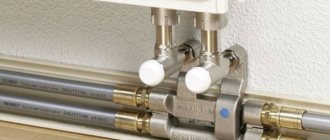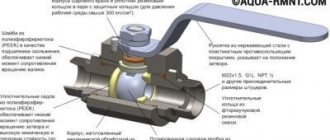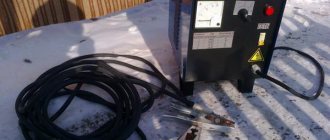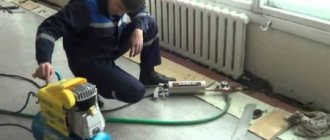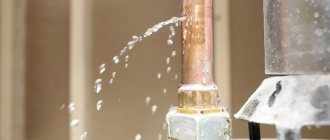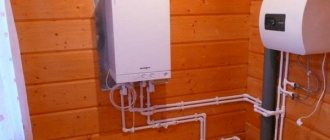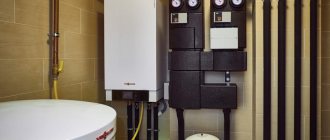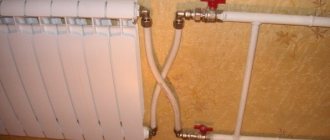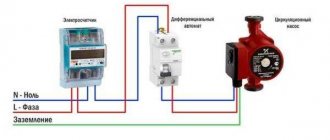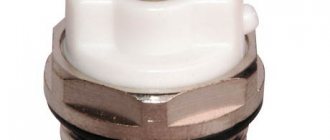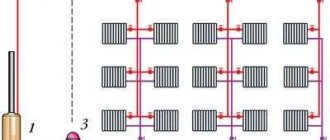A phenomenon such as knocking in heating pipes can actually manifest itself in different ways. It could be, strictly speaking, a knock, or it could also be crackling, seething, or clicking. In any case, the consequences of knocking can be much more serious than the effect on the nerves. If you do not take proper measures in time to eliminate the knocking, you can end up with a very serious emergency situation.
But, before you start eliminating extraneous sounds, you need to determine what kind they are. It is based on the nature of the noise that it is necessary to look for a way out.
If you hear noises, whistles or hums
These kinds of sounds are far from uncommon, especially in an apartment building. As a rule, in a single-family home you encounter this much less often.
The gurgling of water in the pipes, humming, knocking and extraneous noise in the heating system indicate a system malfunction or improper installation.
There may be several reasons for this phenomenon:
- There is a narrowing in the system that prevents water from circulating evenly through the pipes;
- There may be a communication leak;
- Or these sounds may be caused by using pipes with a smaller diameter than necessary.
First of all, it is necessary to check the communication for leaks. If your neighbors have no leaks, then the pipes are most likely noisy in the basement. It is there that the main components of the plumbing and heating systems are concentrated. If there is a leak, it can be detected by a rising stream of steam. In most cases, this is caused by the formation of fistulas in the communication wiring. They can form under a layer of thermal insulation, in valves. By the way, the leak is not always located in close proximity to the noise source. Indeed, in metal pipes the hum spreads over quite considerable distances. To fix the problem, you should not hesitate to call a plumbing team. If no leak was found, then it is quite possible that the reason lies in the deterioration of the permeability inside the pipe. You will need to listen to which areas there is noise. Most likely, these are the areas that will need to be replaced.
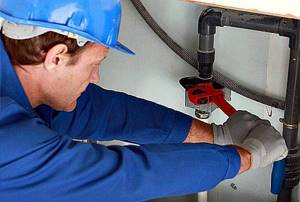
A slight noise in the pipes, a hum is heard, then this is not as critical a situation as when knocking occurs. If noise suddenly appears, you must immediately call a plumbing team.
Although it is possible that the deterioration in pipe capacity is caused by lime deposits. Then a reasonable solution would be to call a specialized team that can remove the scale and break through the system from the blockage.
If heating pipes are knocking and cracking in a private house
In a private home, extraneous sounds can be caused by faulty valves or even damaged pipes. But cracking sounds in pipes may mean that there are foreign solid particles inside the pipe. In addition, crackling can mean:
- Premature wear of some components of the heating system;
- Destruction of valve valve elements;
- The process of expanding metal pipes.
If the clicks are too loud, they turn into a real crack when the system warms up, then first of all we can advise you to drain all the water from the system. This will also remove solid pieces of debris. If in this case the sounds are not eliminated, most likely the heating radiator needs to be replaced. If there are screw valves in the heating circuit of the home, they can cause clicking. The problem is that they were installed incorrectly. In this case, water flows will irradiate them. Over time, this phenomenon will lead to forced opening of the valves. In any case, the valve must be replaced. If this is not done, then it may temporarily block the water circulation, and when opened there is a risk of water hammer.
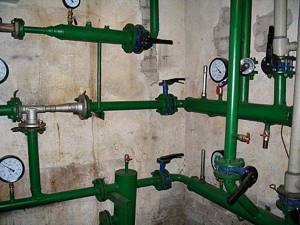
Noise and crackling can cause premature wear of some components of the heating system.
Knocks in pipes and in system batteries can also be caused by thermal expansion of the metal. In this case, a temperature difference is observed, as a result of which the loose parts of the system will be subject to microscopic movements relative to each other. Such shifts are invisible to the eye, but will sometimes produce very loud knocks. The solution is to check the thermal insulation of the pipeline and inspect all pipe attachment points. Fastening must be done at regular, small intervals. In this case, they should be fixed as firmly as possible.
What to do if water boils in the batteries
You can often hear sounds such as gurgling water, even intense seething. As a rule, this is due to the presence of so-called air locks. They are looking for a way out - as a result of which the water in the system can boil. Moreover, this not only leads to discomfort, but also to the fact that the efficiency of the coolant decreases, since, as is known, the thermal conductivity of air is worse than that of water. In order to eliminate air pockets, special taps are often installed at the upper levels of the heating system, through which excess air is released.
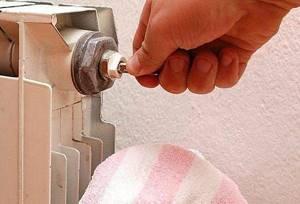
Mayevsky tap is a device for releasing air from central water heating radiators, opened using a special key or screwdriver.
Determining the pressure level
To understand the cause of the flaw, since it could be high pressure, do a small test: open the tap and close the tap - that's all you need to do.
You may have heard a humming sound after closing a cold tap, which means high pressure. What to do if the cold water tap is humming, you will find out below.
Solving the problem is not very difficult: you need to install a special air chamber on the pipe, in front of the tap. It will absorb sudden pressure surges in the pipe.
Chamber operation: the air inside the chamber is compressed and softens the blow when the tap is closed. There are two ways to install the camera:
- using a special additional pipe section;
- using a special muffler for the humming faucet.
Pipe humming due to water hammer
The cause of clicks or knocks can also be a phenomenon such as water hammer. The reason for this is that water, under the influence of inertial forces, cannot instantly stop in the pipe. If the circulation of water in the system is temporarily suspended (for a variety of reasons), then the water, suddenly encountering an obstacle, hits the inside of the pipe. This is called water hammer. You can control the flow of water depending on the temperature using special regulators.
Note! Water hammers and water noises in the heating pipe occur at the moment when the water is completely shut off. After all, liquids are practically incompressible, therefore, inertia cannot be extinguished instantly. Where the water flow stops, the pressure can reach tens of atmospheres. In turn, this can be fraught not only with unpleasant noise, but also with the destruction of system connections, tearing out valves and even rupture of batteries.
Water hammer can occur anywhere in the system. Including even a heated floor system. Accordingly, in this case the knock will be heard under the floor. The strength of the water hammer can be affected by the length of the pipeline. In a heated floor system, it is the most dangerous, since here the pipes are folded over a very large length. Water hammer is also dangerous if a thermostat is installed at the outlet of the heating system. Structurally, it can withstand pressure up to 4 atmospheres, in this case no knocking is observed.
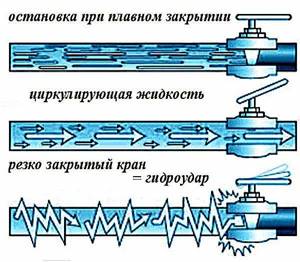
This figure shows the water pressure in the system and the cause of water hammer.
Air jams
The cause of cold batteries is usually air, which does not allow water to flow freely.
An air lock forms for several reasons.
:
Oxygen bubbles accumulate in one of the radiators or at the highest point of the heating system. Because of this, the bottom half of the radiators will be hot and the second half cold. Gurgling sounds also occur when the equipment operates. In multi-storey buildings in the highest apartments, boilers completely stop working.
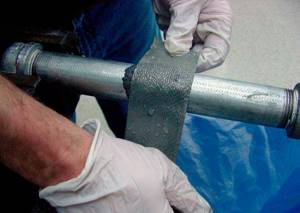
In older apartment buildings, many of the pipes have long since expired. Therefore, they can cause accidents and reduce heat levels
. Microelements contained in the coolant are deposited inside the pipelines. They impede normal water circulation. The correct solution would be to replace the products, but this is not always possible.
Layers of scale form on the inner surface of the boiler, which reduces the pressure in the system. This problem is caused by the use of hard water, saturated with minerals and salts. Special reagents must be added to the equipment to soften the quality of the coolant.
When pipes are corroded or improperly connected, leaks occur. If it is in a visible area, it is easy to seal the hole with sealants. It is more difficult to deal with a problem hidden in the wall or floor. In this case, you will have to cut off the entire branch, fix the problem and install a new section. In addition to sealants, you can use special parts to clamp the pipeline, corresponding to its diameter. If it is not possible to purchase such devices, then it is enough to make a clamp. The leak area is covered with a piece of soft rubber and secured tightly with wire.
If a leak is detected at the radiator or at its junction with the pipe, wrap the hole with a strip of fabric, after soaking it in moisture-resistant construction glue. Sometimes cold welding is used. To avoid such problems, before the start of the heating season, inspect the entire system for damage. It is imperative to start the boiler and check the quality and reliability of its operation.
Other sources of noise in heating pipes
As you can see, the main cause of noise in the heating system is an installation error. But we can name some others:
- The presence of a large pressure difference;
- The coolant does not meet the proper technical operating conditions;
- The pump in the boiler room at home may also simply sound loud;
- If boilers run on diesel fuel, then over time soot may accumulate in them. As a result, the flow of communications deteriorates and unpleasant noise is heard.
Even at the stage of drawing up a design for a heating system in a private home, it is necessary to exclude screw valves and small valves. It is better to use ball valves instead. They do not have a narrowing under the valves, so debris will not accumulate there.
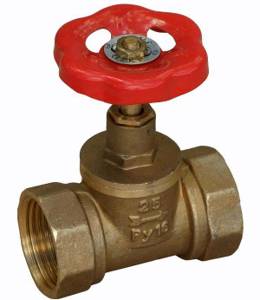
Screw valve - a valve for regulating the outlet of liquids.
If a low-quality pump is used during operation of the heating system, it can also produce extraneous sounds that will be transmitted through the pipes. But even a high-quality pump can fail over time. In this case, the solution is obvious: repair or completely replace the pump.
Methods for cleaning radiators from dirt
During operation of the heating system, dirt accumulates in it: iron oxides, dissolved salts and possible mechanical impurities. But if water moves through the pipes at high speed, then in the radiators the process slows down and the sedimentation of suspended matter increases. Therefore, cleaning radiators is a must.
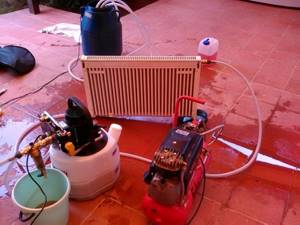
There are two methods: flushing the entire system together and disconnecting the batteries and cleaning using a compressor unit. Favorable conditions are created in the batteries for the accumulation of dirt, since the coolant slows down the movement in them. To flush, the radiator is connected to the compressor, and dirt is cleaned from it with water pressure.
If you carry out annual preventive maintenance of the entire system, then drastic measures will not be required. It is quite possible to limit yourself to a general flushing of the entire heating circuit with ordinary water. Chemical reagents are used in cases where the coolant does not meet the established parameters and significant deposits of salts and scale appear on the working elements.
After using chemicals, leaks may form in radiators and cracks may appear that were successfully covered with dirt.
To avoid an emergency, all equipment must be checked for functionality before starting the system.
Timely preventive maintenance of all components of the heating system will protect it from complex accidents and save the budget.
According to experts
Vladimir Savotkin, heating equipment installer: Recently, modern radiators have become especially popular. They are often installed in old heating systems. But, since the material of old pipes and new radiators has different physical properties, including the coefficient of expansion, the difference in the change in the size of the heating elements can sometimes cause a very loud crackling sound in the apartment.
Konstantin Ustinovich Petrov, specialist in installing radiator heating systems: pipes in the heating system often make noise during startup. At this time, pressure drops are observed in the return and supply pipelines, which may exceed the normalized values. This is why the water makes noise in the heating pipes. As houses are connected to a centralized heating system, the clicks become weaker over time and disappear completely. This is a normal phenomenon and there is no need to be afraid of it.
Summary of what has been said
Sound phenomena such as crackling, noise and bubbling of water are not so rare during the operation of heating systems. However, this does not mean that you have to put up with it. On the contrary, the slightest extraneous sounds should alert you. Methods for eliminating noise will depend on the cause found. If you cannot independently determine the cause of knocking or other noise, then it is better to call a team of specialists who will not only determine its true source, but also eliminate the cause. If measures to eliminate noise are not taken in time, the consequences can be quite disastrous - even serious accidents.
Video
By watching the video, you can find out why the circulation pump is noisy and what needs to be done.

Evgeniy Afanasyev chief editor
Author of publication 08.11.2018
Did you like the article? Save so you don't lose!
- Author: Maria Sukhorukikh
Rate this article:
- 5
- 4
- 3
- 2
- 1
(0 votes, average: 0 out of 5)
Share with your friends!
